Faujis Turned Founders: Meet Retired Soldiers Rebuilding Their Lives as Entrepreneurs
“Life isn’t without risk,” Ardhi Krishna Rao (47), who served in the Indian army for 26 years as a havaldar (sergeant), points out. A native of Gopalpur in Odisha, he often mulled over the future; his retirement was drawing close, and Ardhi knew that sitting idle wouldn’t suit him. Years of intrepidity in the forces had instilled in him a love for adventure.
It is exactly this sentiment that I Create India was looking to tap into. The initiative provides training, mentoring, and handholding support to Indian Army Veterans and officers, helping them launch their businesses post-retirement. Today, Ardhi’s passions have found expression in his business of kewda oil processing. He gives full credit to I Create India for guiding him with the nuances of entrepreneurship.
Known as ‘white lotus’, the kewda flower is no less than a hero in Odisha’s Ganjam district. The processing involves steam distillation, which coaxes flavour out of the flower into an oil that retails for a handsome amount — according to reports, a litre can sell for as close to Rs 5 lakh. The oil is a lucrative aromatic for the food industry.
Having grown up in Odisha, Ardhi was well aware of the mysteries of this fragrant screwpine. But, he admits he had never thought of it from a commercial standpoint. It was his interaction with I Create India that changed this. “The course they provided helped me understand how to keep a business going.” Ardhi adds, “People wouldn’t take a fauji (army official) turned businessman too seriously. So, I had to put in an extra effort to be good at my idea.”
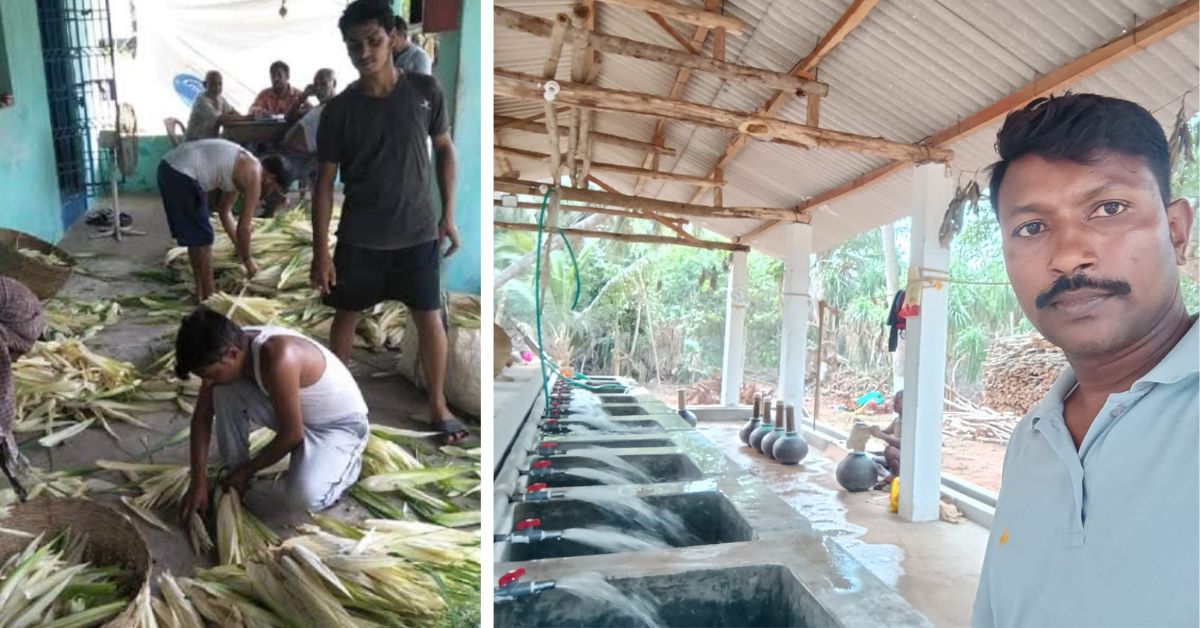 Ardhi Krishna Rao (47), who served in the Indian army for 26 years as a havaldar (sergeant) and now has a business hinged on kewda oil
Ardhi Krishna Rao (47), who served in the Indian army for 26 years as a havaldar (sergeant) and now has a business hinged on kewda oil
Ardhi invested days and nights across three months, closely interacting with farmers engaged in kewda oil farming to understand the intricacies of this potential venture.
During this time, he learnt that it takes a total of 30,000 kewda flowers to render one kg of product. “I purchase the kewda flowers from farmers for Rs 30 a piece. It is a big investment. When I started two years ago, everyone advised me against it, telling me that it was a risk to invest all my savings into something that might not work.”
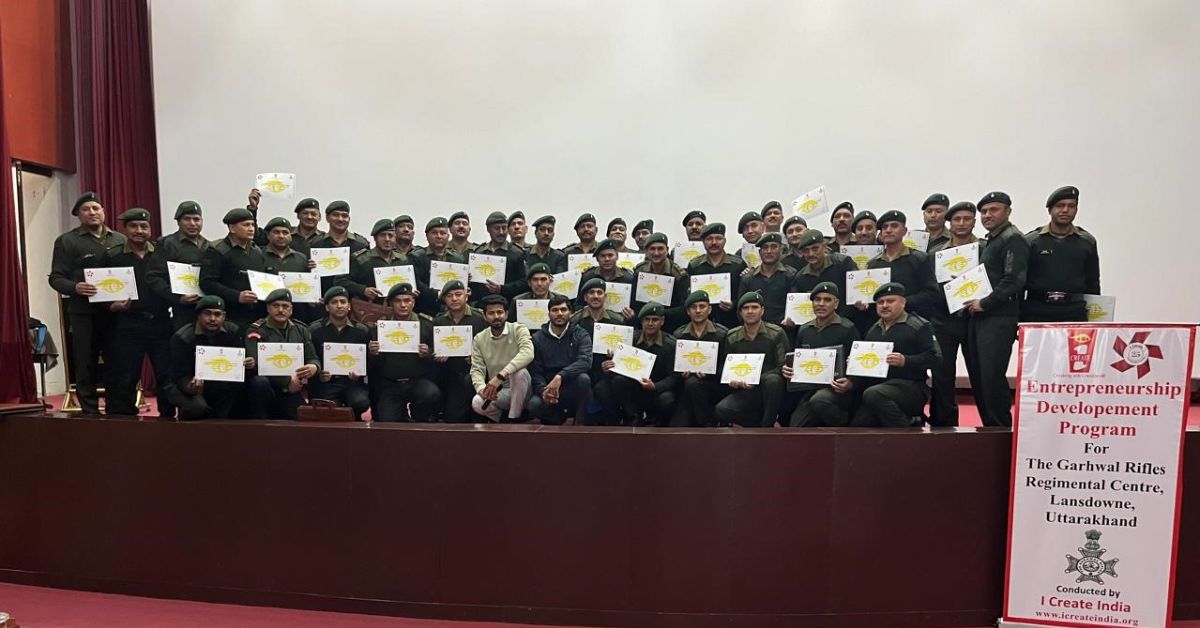 I Create India empowers army veterans to start their own businesses and thus reclaim their agency
I Create India empowers army veterans to start their own businesses and thus reclaim their agency
Ardhi now sees his idea as a risk that is paying off — in big dividends.
Likewise, for many retired army officials whose dreams have scaled under the aegis of I Create India.
Chief mentor, Ulhas Kamat, shares that this model of empowerment came after an inflection point. “Our organisation has been in existence for 25 years, with the focus being entrepreneurship at the grassroots level. For the first 15 years or so, we concentrated on schools, colleges and self-help groups, but then in 2015, we turned our gaze to army veterans.”
Reasoning this shift, Ulhas underscores the statistics, “The majority of army personnel retire at the age of around 35. Around 60,000 of them retire each year. This seemed a potential target group where we could have a major impact.”
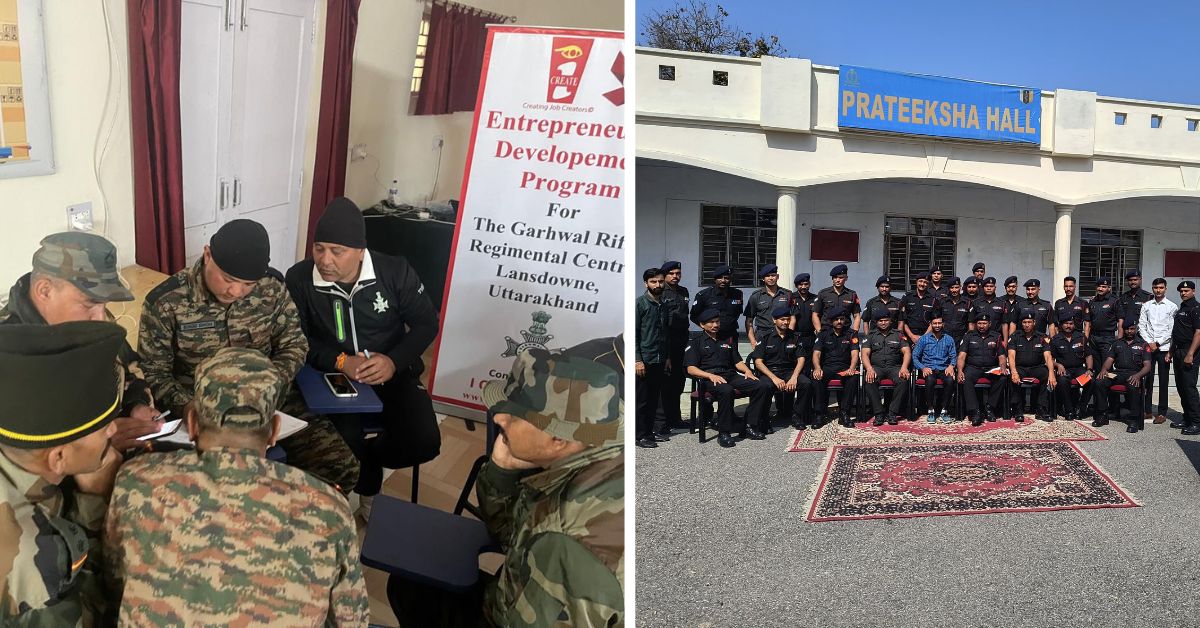 The army veterans are mentored, given support with ideating a business, and also guided with the nuances of entrepreneurship
The army veterans are mentored, given support with ideating a business, and also guided with the nuances of entrepreneurship
Thus began the journey of approaching the Army Service Corps in Bengaluru with a pitch for a pilot programme. These centres see many personnel flocking to them for the completion of their retirement paperwork; it would be an ideal time to pitch them the idea of entrepreneurship, Ulhas estimated.
The success of the model at the ASC Centre culminated in an MoU signed between I Create India and the Directorate of Indian Army Veterans, thus formalising the approach.
Turning army officials into entrepreneurs
For C. Kanniappan (52), who trained at the I Create India centre at Madras Engineering Group in Bengaluru, the course was transformational in more ways than one. While Kanniappan tested entrepreneurship waters with an idea for rice trading, he recently dived into the deeper end through a well-formulated supermarket model. Today, Kanniappan’s store in Tamil Nadu’s Ranipet is the neighbourhood’s go-to provisions store for rice, milk, sugar and tea leaves.
Was this ex-army man’s foray into entrepreneurship serendipitous or a well-calculated decision?
“After decades of working with the forces, I realised that no other form of work would give me the same level of satisfaction,” he shares. So, he was compelled to test his hold on business development.
“The biggest learning I had from them [I Create India] was on how to generate traffic for a business. The team guided us with estimating consumer rates, deciding a price against the MRP, sourcing the materials from the producers, etc.” As Kanniappan details his business tactics, his enthusiasm is evident.
Success stories like these thrill Ulhas, who envisioned the I Create India model as one giving army professionals everything they need to scale their ideas. The 1950 entrepreneurs that they have managed to create over the years are a conspicuous nod to their efforts.
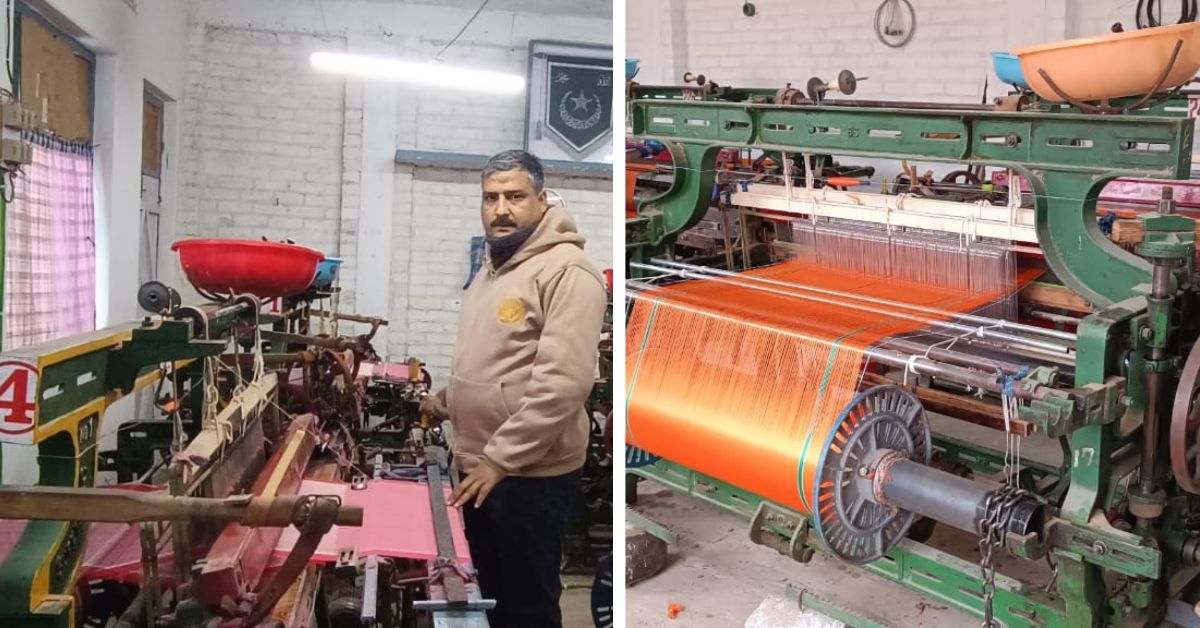 Khush Naseeb’s family has been engaged in the handloom business ever since independence
Khush Naseeb’s family has been engaged in the handloom business ever since independence
Every story is unique in itself.
For some army personnel, the mentorship provides them with the wherewithal to start from scratch, while for others, the agency to revisit the dreams they once harboured. For instance, Khush Naseeb Ahmed (44), who helms a handloom mill in his hometown of Tanda, Uttar Pradesh. The wheels of Khush’s family handloom business have been chugging since 1947. “My great-grandfather, grandfather and father were all engaged in this business. So, after the training I received from I Create India, I too decided to join them. I want to carry on my family legacy.”
To Khush Naseeb, working at the loom is second nature. “I’ve grown up watching how it operates. I am earning Rs 15000 a month from it.” What he most enjoys about being a business owner is that it gives him ample scope to experiment, something he says he wouldn’t be able to achieve if he were a regular employee.
An impact that transcends numbers
Impact is spinning a success story across I Create India’s 17 centres. Elaborating on the roadmap, Ulhas says the first step is Entrepreneurial Awareness Creation, which lasts for a few hours, where the spark of possibility is ignited among these personnel who are on the brink of retirement. Then follows equipping these entrepreneurs with well-proven tools and techniques for business success through a five-day workshop.
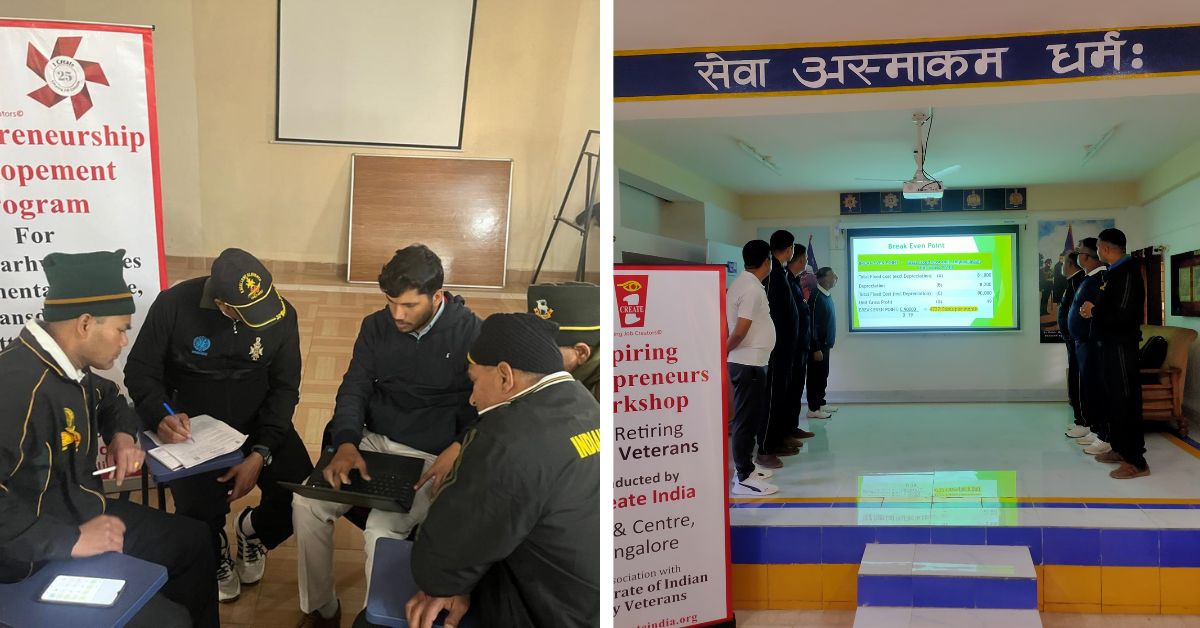 I Create India’s team is in a constant feedback loop with the veterans even after they return to their homes
I Create India’s team is in a constant feedback loop with the veterans even after they return to their homes
In the next stage, the personnel are encouraged to come up with a business idea. “We never give them any idea of the kind of business they should start. Instead, we tell them how to generate their ideas. This helps them identify their skills and how using those skills, they can solve a problem in the community,” Ulhas explains.
Once the idea is in place, experienced mentors work closely with these protégés to refine their business plans, strategies, and execution. Support is extended even beyond the programme’s scope. I Create India’s team is in a constant feedback loop with the veterans even after they return to their homes. Ulhas clarifies, “While we do not provide funding, we help them [the army personnel part of the programme] access loans or existing schemes. Since the median value of their investment is below Rs 5 lakh, they don’t feel the need to go to lending institutions.”
And some phenomenal ideas have emerged from the model.
Davinder Singh (38) runs a farm equipment rental service in his hometown of Gurdaspur in Punjab. The retired army professional was born to parents who were farmers, making him privy to the woes of incompetent machinery. “Farming equipment is expensive, most farmers cannot afford these machines that go anywhere up to Rs 5 lakh.” When ideating a business plan at the I Create India session, Davinder was keen to choose one that aligned with his vision and experiences.
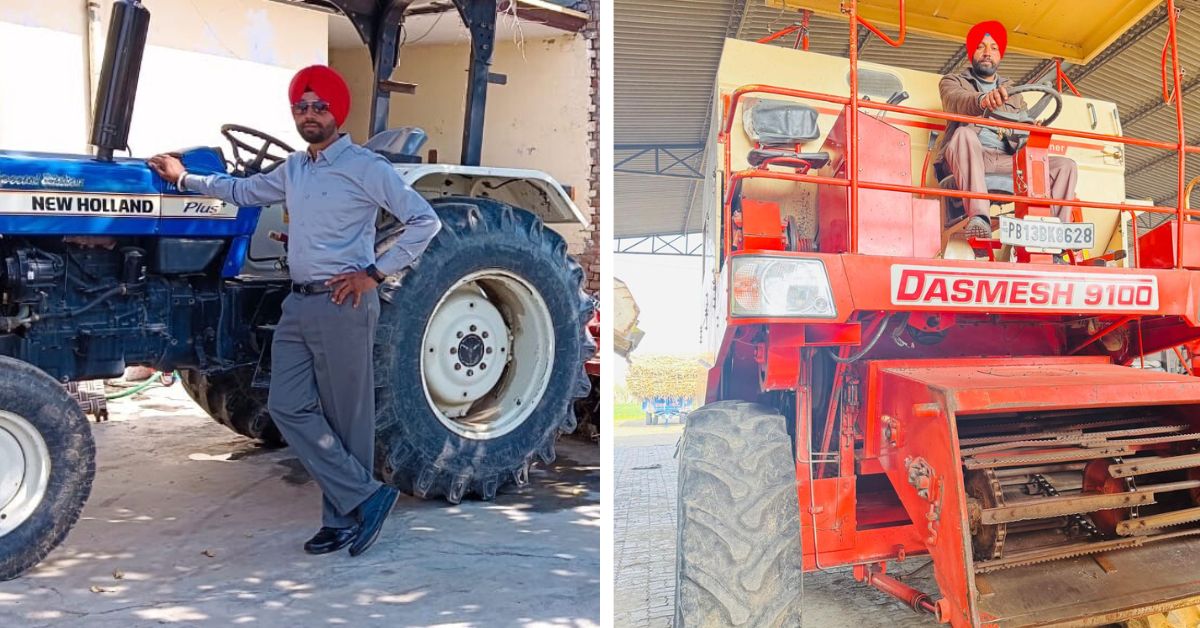 Davinder Singh (38) runs a farm equipment rental service in his hometown of Gurdaspur in Punjab
Davinder Singh (38) runs a farm equipment rental service in his hometown of Gurdaspur in Punjab
He is thrilled to be helping farmers rent super seeders, tractors, trolleys, and machines that can separate the grain from the chaff. While this is going great, he is sure that his next idea will also forge a bright trail. “The brick kilns in India burn coal to create heat that will burn the bricks. But, we are coming up with a process that will burn stubble instead, thus helping farmers get rid of the stubble while also helping the brick kilns.” Thinking out of the box is a skill he learnt at the workshops, he says.
No longer does the ownership of machinery dictate farmers’ cropping patterns; Davinder equipment comes to the rescue. “My harvester machine works continuously for 20 days during the harvest season. I have two of these and earn Rs 14 lakh a year from them.”
For some army personnel, entrepreneurship helps them grapple with financial constraints that follow retirement. As Varahala Babu Ruttala (40) from Vishakhapatnam points out, the pension doesn’t always suffice. During his last posting near Leh, Varahala would often find himself plagued with worries about the future. “My parents are old and my wife works. I have two children. This is where the idea to do business came from. I needed to look after my family.”
The dominance of cashew plantations across Vishakhapatnam was a solution in disguise for Varahala, who started a thriving cashew nut processing unit after I Create’s mentorship.
Ulhas is proud of the ripple effect of the I Create India model. While the ostensible goal is to give army veterans a passion to pursue post-service, it is also a step towards helping them reclaim their agency.
Edited by Saumya Singh; All pictures courtesy I Create India
Sources
News